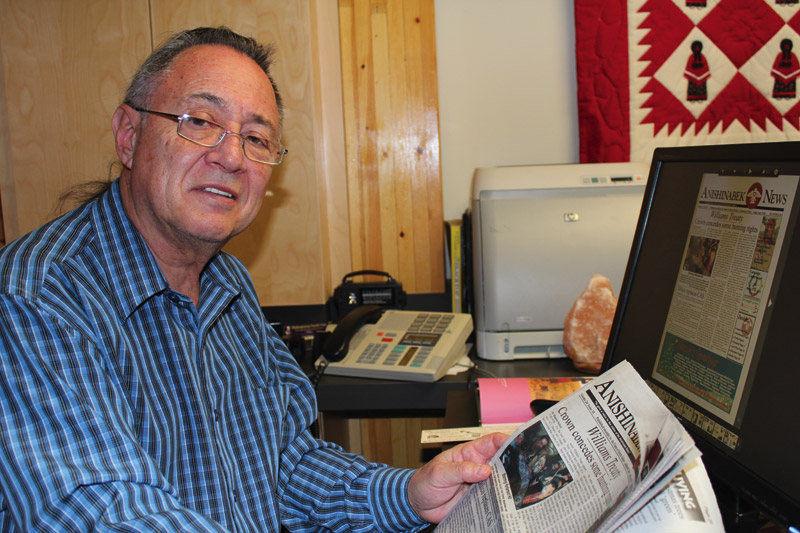Harper not learning from ‘mistakes of the past’
By Maurice Switzer
First Nations know they have a good idea when the Harper government doesn’t want anything to do with it.
That’s how it is in 2013 as we commemorate the 250th anniversary of the Royal Proclamation of 1763 – a document fundamental to the formation of Canada — while the federal government is publicly mute about it.
Most Canadians know little or nothing about this watershed event, which historians say made possible the settlement and foundation of their nation.
Issued on October 7, 1763 in the name of King George III, the Proclamation is certainly accorded significant status in the Canadian Encyclopedia, which says it was issued: “to establish a basis of government administration in the North American territories formally ceded by France to Britain in the Treaty of Paris, 1763, following the Seven Years’ War.
“It established the constitutional framework for the negotiation of Indian treaties with the aboriginal inhabitants of large sections of Canada.
“As such, it has been labelled an ‘Indian Magna Carta’, or an ‘Indian Bill of Rights’.
“The document is referred to in Section 25 of the Constitution Act, 1982. This provision details that there is nothing in Canada’s Charter of Rights and Freedoms to diminish the rights and freedoms that are recognized as those of aboriginal peoples by the Royal Proclamation.”
What does this mean for the average Canadian?
It means that the mightiest military-political power in world history – the British Empire – realized that they did not have a hope of creating permanent settlements in North America, or of keeping military foes like the French, and in 1812 the Americans, at bay without the Indians as their allies.
After the 1763 Treaty of Paris sealed Britain’s military triumph over the French in North America, the Odawa leader Pontiac and a relative handful of warriors captured or controlled nine of 11 British forts on the western frontier of what was then Canada.
As the Canadian Encyclopedia puts it: “There is no doubt that Pontiac’s military success played a major role in demonstrating to the British that aboriginal peoples were still masters of their own ancestral lands. That principle was written into the Royal Proclamation and is the basis of First Nations land claims to this day.”
So the Royal Proclamation was issued, and with it the description of a huge swath of central North America that was to be a vast Indian reserve, in which the inhabitants were to be “unmolested” by those who were settling lands that would become Canada and the United States.
Word was sent out by Sir William Johnson, Superintendent of Indian Affairs for British North America, that he wished to meet with the nations of Indians who lived around the Great Lakes basin to offer them the terms of the Royal Proclamation and seek a military alliance with them.
The largest gathering of Indian leaders in the continent’s history – an estimated 2500 chiefs and headmen – gathered at Niagara in July of 1764. They accepted Johnson’s promises, two Wampum Belts, and his promise that “your people will never want for the necessities of life, so long as the world exists.”
The groundwork was in place for the peaceful settlement of Canada, and treaties that would promise the sharing of traditional Indian territories.
What has Prime Minister Stephen Harper done to celebrate this historic milestone?
With the year almost half over, he has ignored repeated requests by First Nations to acknowledge the importance of the Royal Proclamation.
This is the same Stephen Harper who made the following statement Jan. 24, 2012 at the close of the Crown-First Nations Gathering in Ottawa:
“Since first contact and the issuance of one of our founding constitutional documents, the Royal Proclamation of 1763, the evolving Crown – First Nations relationship has helped shape modern-day Canada. First Nations fought as allies of the Crown in the American Revolution (1775-1783), the War of 1812; and have continued their support of Canada in every major conflict since. Unfortunately, there have been low points in our relationship. A series of misguided and harmful government policies in our past has shaken First Nations confidence in our relationship.
“We cannot undo the mistakes of the past, but we can learn from them and affirm that they will not be repeated. In this year, the 200th anniversary of the War of 1812 and with next year being the 250th anniversary of the Royal Proclamation of 1763, it serves as an appropriate time to reinvigorate the Crown-First Nation relationships.”
So, Prime Minister, when does the “reinvigorating” start?
Maurice Switzer is a citizen of the Mississaugas of Alderville First Nation. He serves as director of communications for the Union of Ontario Indians and editor of the Anishinabek News.


